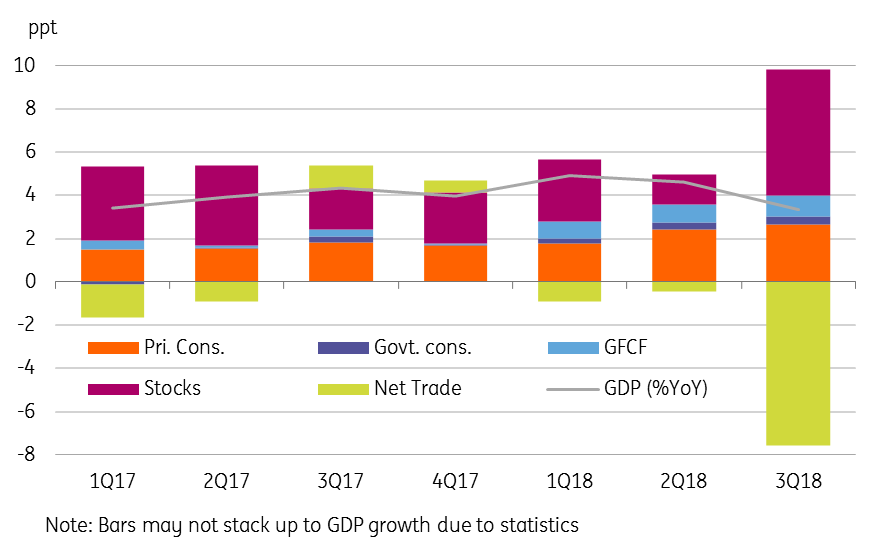Thailand: A huge downside GDP miss
The 3Q18 performance is bad enough to dent the official optimism about the economy this year and the next, with continued 4%-plus GDP growth. It should also dampen the central bank’s hawkish rhetoric on tightening recently
| 3.3% |
3Q18 GDP growth |
| Worse than expected | |
Net trade dents GDP growth
Thailand’s GDP growth slowed more than expected to 3.3% year-on-year in the third quarter of 2018 from 4.6% in the second quarter. The outcome was far below the analysts’ consensus, which centred on 4.2% growth. We were at the low end with a 3.7% estimate.
As the graph below shows, net exports were the main drag on GDP growth in 3Q18, led by a sharp slowdown in export growth. While import growth remained robust, this seems to be more due to higher oil imports rather than an improvement in domestic demand. The contribution of private consumption to GDP was slightly better than the second quarter, while that of government consumption and fixed capital formation was little changed. This left inventories in the prime spot as the GDP driver for yet another quarter, not a healthy sign for future growth.
Where GDP growth is coming from?

No more reasons for optimism
We believe the data is bad enough to dent the official optimism on the economy’s performance this year and the next, with continued 4%-plus GDP growth, as well as dampen the Bank of Thailand's (BoT) hawkish rhetoric on tightening recently. The National Economic and Social Development Board (NESDB), the agency responsible for the National Accounts statistics, forecasts 2018 GDP growth at 4.2%, slower than the finance ministry’s 4.5% and the BoT’s 4.4% forecasts.
On its own, the 3Q18 data has pushed our 2018 growth forecast to 4.1% from 4.2%. We anticipate a further slowdown to 3.8% in 2019 (consensus 3.9%, BoT 4.2%).
Weakening support for the THB
Our view of the BoT maintaining the policy rate at 1.50%, the level it’s been at since early 2015, in the rest of the year remains on track. Aside from a softer USD and falling oil prices recently, we see no reason to remain positive on the Thai baht (THB) as the currency is also losing the strong support it enjoyed from the wide current account surplus. The THB’s 1.9% depreciation since October is the worst among Asian currencies. We continue to see the USD/THB rising to 33.60 by the end of the year from the current spot rate of 32.96.
Download
Download article
19 November 2018
Good MornING Asia - 20 November 2018 This bundle contains 3 Articles"THINK Outside" is a collection of specially commissioned content from third-party sources, such as economic think-tanks and academic institutions, that ING deems reliable and from non-research departments within ING. ING Bank N.V. ("ING") uses these sources to expand the range of opinions you can find on the THINK website. Some of these sources are not the property of or managed by ING, and therefore ING cannot always guarantee the correctness, completeness, actuality and quality of such sources, nor the availability at any given time of the data and information provided, and ING cannot accept any liability in this respect, insofar as this is permissible pursuant to the applicable laws and regulations.
This publication does not necessarily reflect the ING house view. This publication has been prepared solely for information purposes without regard to any particular user's investment objectives, financial situation, or means. The information in the publication is not an investment recommendation and it is not investment, legal or tax advice or an offer or solicitation to purchase or sell any financial instrument. Reasonable care has been taken to ensure that this publication is not untrue or misleading when published, but ING does not represent that it is accurate or complete. ING does not accept any liability for any direct, indirect or consequential loss arising from any use of this publication. Unless otherwise stated, any views, forecasts, or estimates are solely those of the author(s), as of the date of the publication and are subject to change without notice.
The distribution of this publication may be restricted by law or regulation in different jurisdictions and persons into whose possession this publication comes should inform themselves about, and observe, such restrictions.
Copyright and database rights protection exists in this report and it may not be reproduced, distributed or published by any person for any purpose without the prior express consent of ING. All rights are reserved.
ING Bank N.V. is authorised by the Dutch Central Bank and supervised by the European Central Bank (ECB), the Dutch Central Bank (DNB) and the Dutch Authority for the Financial Markets (AFM). ING Bank N.V. is incorporated in the Netherlands (Trade Register no. 33031431 Amsterdam).